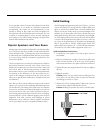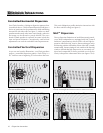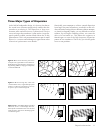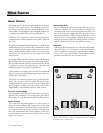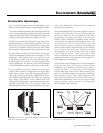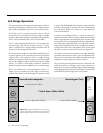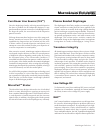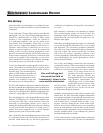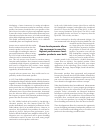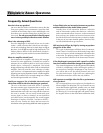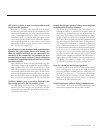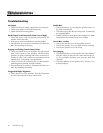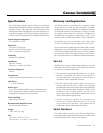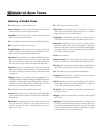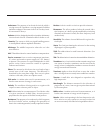
18 Frequently Asked Questions
FREQUENTLY ASKED QUESTIONS
How do I clean my speakers?
Just use a dust free cloth or a soft brush to remove the dust
from your speakers. We recommend a specialty cloth
(available at the XStatic shop at www.martinlogan.com)
that cleans your speakers better than anything else we
have tried. Do not spray any kind of cleaning agent
on or in close proximity to the electrostatic element.
What is the advantage of ESL?
Since the diaphragm is uniformly driven over its entire
surface—unlike a tweeter that is only driven at its edges—
it is the only technology that can be made large enough to
play bass, yet is still light enough for high frequencies. This
unique property allows for the elimination of high fre-
quency crossover points and their associated distortions.
What size amplifier should I use?
We recommend an amplifier with 100 to 200 watts per
channel for most applications. Probably less would be
adequate for our smaller hybrids or when used in home
theater where a subwoofer is employed. Our hybrid
designs will perform well with either a tube or transistorized
amplifier, and will reveal the sonic character of either
type. However, it is important that the amplifier be stable
operating into varying impedance loads: a stable amplifier
will be able to deliver twice its rated wattage into 4 Ohms
and should again double into 2 Ohms.
Could you suggest a list of suitable electronics and
cables that would be ideal for MartinLogan speakers?
The area of electronics and cable choice is probably
the most common type of question that we receive. It is
also the most subjective. We have repeatedly found
that brands that work well in one setup will drive someone
else nuts in another. We use many brands with great
success. Again, we have no favorites; we use electronics
and cables quite interchangeably. We would suggest
listening to a number of brands—and above all else—
trust your ears. Dealers are always the best source for
information when purchasing additional audio equipment.
Is there likely to be any interaction between my speakers
and the television in my Audio/Video system?
Actually, there is less interaction between a television
and an electrostatic speaker than between a television
and a conventional system. However, we do recommend
that you keep your speakers at least one foot away from
the television because of the dynamic woofer they employ.
In the case of our center channel speakers, however, they
are fully shielded and can go anywhere.
Will my electric bill go ‘sky high’ by leaving my speakers
plugged in all the time?
No. A pair of MartinLogans will draw about 5 watts max-
imum. There is circuitry to turn off the static charge when
not in use; however, actual consumption will remain close
to the same. The primary purpose of the sensing circuitry
is to prevent dust collection on the electrostatic element.
If the diaphragm is punctured with a pencil or similar
item, how extensive would the damage to the speaker be?
Our research department has literally punctured hundreds
of holes in a diaphragm, neither affecting the quality of
the sound nor causing the diaphragm to rip. However,
you will be able to see the actual puncture and it can
be a physical nuisance. If this is the case, replacing the
electrostatic transducer will be the only solution.
Will exposure to sunlight affect the life or performance
of my speakers?
We recommend that you not place any loudspeaker in
direct sunlight. The ultraviolet (UV) rays from the sun can
cause deterioration of grill cloth, speaker cones, etc. Small
exposures to UV will not cause a problem. In general,
the filtering of UV rays through glass will greatly reduce
the negative effects on the electrostatic membrane itself.
Frequently Asked Questions



